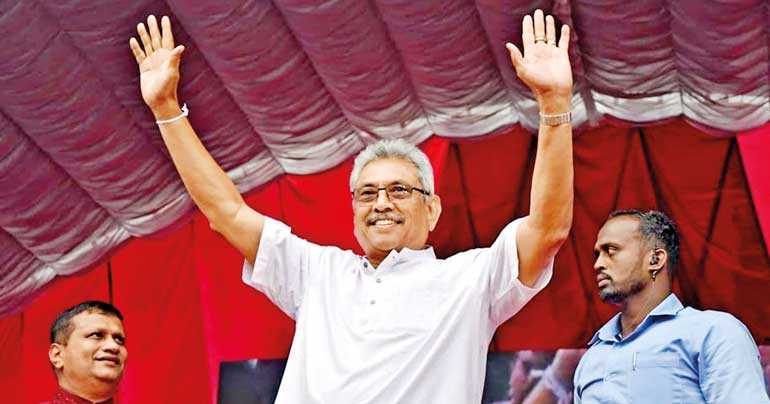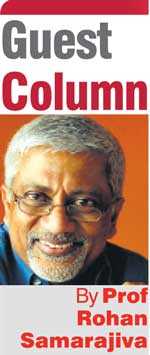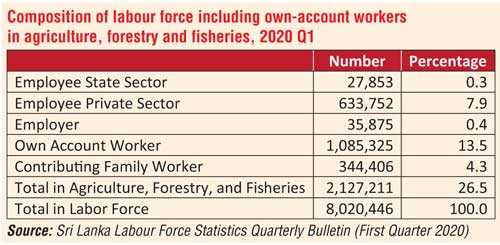Tuesday Feb 24, 2026
Tuesday Feb 24, 2026
Tuesday, 8 September 2020 00:19 - - {{hitsCtrl.values.hits}}

This President, they would claim, has been elected to take decisive action without having to deal with Parliamentary oversight and judicial challenges – Pic by Shehan Gunasekara
If we shift our focus away from the minutiae of the proposed 20th Amendment to the big picture, we can see that it is about concentrating power in the President and unelected and unaccountable advisors around him, and disempowering Parliament, independent Commissions, and those who would challenge legislation before the courts. After successfully propagating the narrative delegitimizing Parliament (“225ma epa”), the SLPP seeks to consolidate the concentration of power in a single power center, the presidency, through Constitutional reform.
There is little resistance to the planned dismantling of widely accepted democratic principles such as checks and balances because the mindset of our people is that of Kandyan feudalism which allowed for an absolutist King, checked if at all by the institution of the Sangha and very rarely the variga sabha. That story has been told. The counter-productiveness of this primitive form of governance for a modern economy is the subject of this column.
Imperfect information
I have been researching, teaching, and practicing infrastructure regulation, a specialized sub-field of public policy or administration, for many years. One of the key lessons imparted to our students is how to make decisions with imperfect information.
Infrastructure is fundamental to modern life (and it was conspicuously absent in the Kandyan Kingdom). We turn on switches and taps, and expect rooms to light up and clean water to flow. We take for granted the ability to see the first steps of a grandchild on the other side of the world. But behind these simple conveniences are extraordinarily complex mechanisms and massive investments that become visible only at moments of failure. The effects of decisions on investment and design affect all citizens, even non-users of services, and shape the long-term trajectory of the economy.
Infrastructure regulation is about creating the conditions for the efficient supply of services essential for modern life while minimizing negative effects. This is no easy task. Future demand, the availability of resources and their costs, and even environmental effects far into the future are impossible to ascertain with certainty. But postponing decisions is unwise, as we have learned from delays in commissioning low-cost electricity generators.
What we recommend is a two-pronged approach: analysis of the best-possible data, minimizing biases; and broad public consultation. The former is common sense. Companies making investment decisions or even consumers making major purchases do it. But the latter is less common, even in government, though it is now beginning to percolate into regular public policy in many developing countries.
When the consequences of error are large, it makes sense to have multiple sets of minds applied to the problem; for multiple perspectives to be at the table; and for all evidence to be tested. Because the stakes are high and so many of the stakeholders see problems as zero-sum, consultation requires care and time. If procedures are violated (or even when they are followed) appeals to judicial or political authorities are likely, causing further delay. Therefore, many steeped in traditional administrative culture dislike consultation and its pre-requisite, transparency of decision making.
Yet they discount the benefits. Private-sector actors tend to have in-depth and current knowledge about many areas of the economy and society. A properly conducted consultation offers a formal pathway for stakeholders to influence policy or at least to mitigate negative outcomes. Consultations therefore offer government officials high-quality information organized and presented by motivated organizations and individuals. They create a sense of buy-in for contentious policies. Evidence of consultations conducted in good faith is helpful in appeal-proofing administrative or regulatory decisions.
In our government culture, even practices inherited from Britain such as the issuance of White Papers which allow for broad consultation have gone into desuetude. Interest in data and evidence and the ability to engage in analysis have also declined.
Unadvised by high-caliber officials, without the benefit of consultations, and not following basic principles of administration, in many instances the President’s or a Minister’s opinion is the sum and substance of policy making. Many costly mistakes have been made, such as the later-reversed Glyphosate ban of former President Sirisena. The decision was taken quickly and saved a lot of time that would have been eaten up by preparing for consultations and listening to informed stakeholders and experts. But in the end, the costs were much higher, in terms of lost exports and various other ill effects.
What does this have to do with the 20th Amendment?
The overall thrust of the 20th Amendment is the concentration of power in the Presidency, a single individual, and the disempowerment of those who may pose difficult questions or bring to bear other perspectives. It is aligned with the thinking described above which eschews consultation and transparency in the name of quick and decisive action. Many would agree that such a concentration of power would be unwise if the President in question was Mr Maithripala Sirisena, now an object of ridicule to many. But a sizeable number would say that the current President is a technocrat who appreciates the value of expertise and has the support of many professionals, such as those from Viyath Maga. This President, they would claim, has been elected to take decisive action without the distractions of Parliamentary oversight and judicial challenges.
The argument carries within it its own refutation. A Constitution is not made for an individual. It should accommodate technocrats as well as bumbling idiots. But let us look at the quality of the current President’s decisions and the information he is basing them on, using the example of food-import restrictions. Here is the President’s rationale: “In order to earn a stable and strong income for the rural farmers who make up about 40% of the population, we need to develop confidence that they would get a high price for their produce and assure a stable market for them.” The claim that “rural” farmers constitute 40 percent of the population is factually wrong. The policy based on this erroneous data is open to debate (for which this is not the place).
The percentage of the work force engaged in agriculture was 26.5 in 2020 Q1 and has ranged from a low of 24.3 in 2019 Q2 to a high of 27.1 in 2019 Q4. It has not exceeded 30 percent in many years. This number includes the entirety of persons working in agriculture (including plantations), forestry and fisheries, not just agricultural smallholders, which is what appears to be meant by rural farmers. Even if we assume that all employers, all own-account workers and all contributing family workers in the Table below are smallholders who would benefit from protectionist policies, the total would still be 18.3 percent of the labor force, less than half the number claimed by the President. Because many tea and rubber smallholders exist and because the fisheries sector has many own-account workers, the actual percentage should be considerably lower. When calculated for the population, as opposed to the labour force, it should be in the single digits.
What this illustrates is the uninformed nature of policy making by a President supported by a massive Presidential Secretariat, the Department of Census and Statistics and Viyath Maga. There may be other rationales for depriving Sri Lankan consumers of low-cost food, but it is not because 40 percent of population will benefit from protectionism.
The solution is more transparency, more oversight by Parliamentary Committees, and more engagement of the private sector and the public in policy making and implementation, not further concentration of power in one individual and his unelected and unaccountable officials and advisors as in the regressive 20th Amendment.